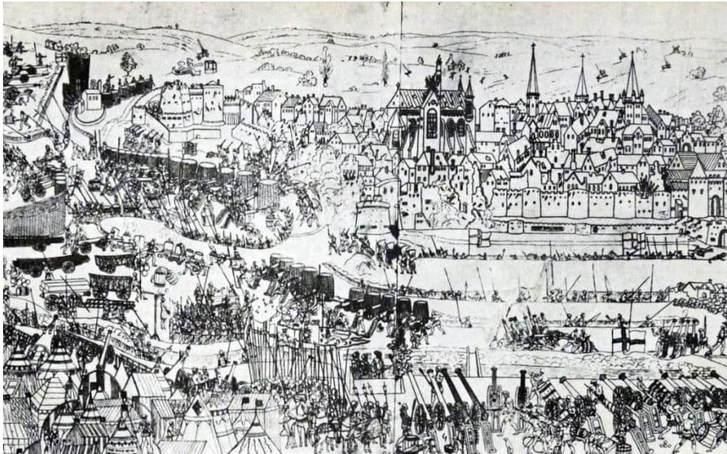Henry VIII, the Reign - the Blog
by Mark Holinshed
Anne Boleyn – Henry’s Retribution in Boulogne
A Melancholic and Hapless King
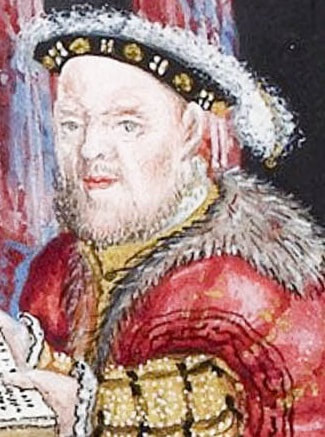
In early 1543 England and the Holy Roman Empire, ruled by Charles V of Spain, signed a treaty to wage war on France within two years. Henry VIII had re-joined the Habsburg – Valois war that had dogged Christendom for decades
For Henry VIII this was a mission devised to rebuild a reputation which had become the butt of ridicule after revelations about his former wife Catherine Howard who a had been exposed as something of a harlot.
Henry had been king for well over thirty years now, but for the past two or three he had been on his own. No Wolsey, Boleyn or Cromwell to shoulder the responsibility of government.
Charles, for now, Henry’s ally, not so long ago had goaded him over his weaknesses. Charles, Henry heard, was amused that after all these years the English king had failed to collect pensions due to him from King Francis of France dating back to Wolsey’s days. Charles, he was told, privately delighted in Schadenfreude where Henry was concerned. His failure to collect what he was owed after all those years and the perception of feebleness that went with it had made Henry descend into an ever more hapless state.
Henry was a gullible fool; indeed, French ambassador Charles de Marillac expressed concern about his very sanity. ‘And finally, he took to tears regretting his ill luck in meeting with such ill-conditioned wives and blaming his Council for this last mischief. The ministers have done their best to make him forget his grief, and he is gone twenty-five miles from here with no company but musicians and ministers of pastime.’
The King of England had woes upon woes. Depending on which way you view the laws of the day, he had one or two child bastards. Negotiations with King Francis of France or the Holy Roman Emperor for a matrimonial match with Henry’s daughter Mary were forever weighed down over her status. Her father would not recognise Mary as being born in wedlock; moreover, Henry’s title of Supreme Head of the Church was unacceptable to any potential ally.
He was also doing battle in the north with the Scots who were famously allied with France in the Auld Alliance. That situation was compounded by the recent birth of Mary Queen of Scots who might have a future claim on the throne of England.
For Henry VIII this was a mission devised to rebuild a reputation which had become the butt of ridicule after revelations about his former wife Catherine Howard who a had been exposed as something of a harlot.
Henry had been king for well over thirty years now, but for the past two or three he had been on his own. No Wolsey, Boleyn or Cromwell to shoulder the responsibility of government.
Charles, for now, Henry’s ally, not so long ago had goaded him over his weaknesses. Charles, Henry heard, was amused that after all these years the English king had failed to collect pensions due to him from King Francis of France dating back to Wolsey’s days. Charles, he was told, privately delighted in Schadenfreude where Henry was concerned. His failure to collect what he was owed after all those years and the perception of feebleness that went with it had made Henry descend into an ever more hapless state.
Henry was a gullible fool; indeed, French ambassador Charles de Marillac expressed concern about his very sanity. ‘And finally, he took to tears regretting his ill luck in meeting with such ill-conditioned wives and blaming his Council for this last mischief. The ministers have done their best to make him forget his grief, and he is gone twenty-five miles from here with no company but musicians and ministers of pastime.’
The King of England had woes upon woes. Depending on which way you view the laws of the day, he had one or two child bastards. Negotiations with King Francis of France or the Holy Roman Emperor for a matrimonial match with Henry’s daughter Mary were forever weighed down over her status. Her father would not recognise Mary as being born in wedlock; moreover, Henry’s title of Supreme Head of the Church was unacceptable to any potential ally.
He was also doing battle in the north with the Scots who were famously allied with France in the Auld Alliance. That situation was compounded by the recent birth of Mary Queen of Scots who might have a future claim on the throne of England.
Back in the Saddle
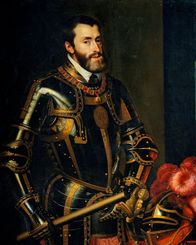 Charles V Holy Roman Emperor
Charles V Holy Roman Emperor
Now, after the Catherine Howard debacle, over which Henry shredded many a tear he yearned to prove himself a real man, not least to his new wife, the Seymour controlled courtesan, Catherine Parr.
Henry had agreed to the treaty on the basis that he would go into battle, on the field with Charles V and reclaim the Angevin Empire, which suited the Seymours, they suspected he would kill himself in the process, and they would (and did) profit from the ensuing mess.
During the coming months, plans were set in motion. As the campaigning season began the following year, throughout May and June 1544, fighting men were ferried across the Channel to build up forces in the Pale of Calais, ready to begin the invasion.
By mid-June, Henry’s war was underway. The king, however, was still in England, and some efforts were made to keep him from the stress of the operation. Ambassador Chapuys reported his own concerns over Henry’s obstinacy to Charles; he told him that Henry VIII was too old, was too overweight and had ‘the worst legs in the world’.
He also reported to Charles’s sister Mary Queen of Hungary, who was regent in the Netherlands. ‘All those about him have tried every means to dissuade him from it but it is no use,’ and Chapuys ‘does not think that there can be any other means except that the Emperor should wish to excuse his going, for the King would hold it a point of honour to go if the Emperor were there.’
Charles certainly did not agree with that idea, he was not going to excuse himself from going into battle for anyone. While he was sympathetic to Henry’s health problems – or claimed he was – the emperor was younger and in his own words ‘lustier’ than the King of England. After all, he had come from Spain via Italy and Germany, specifically, to lead his army in battle.
Henry had agreed to the treaty on the basis that he would go into battle, on the field with Charles V and reclaim the Angevin Empire, which suited the Seymours, they suspected he would kill himself in the process, and they would (and did) profit from the ensuing mess.
During the coming months, plans were set in motion. As the campaigning season began the following year, throughout May and June 1544, fighting men were ferried across the Channel to build up forces in the Pale of Calais, ready to begin the invasion.
By mid-June, Henry’s war was underway. The king, however, was still in England, and some efforts were made to keep him from the stress of the operation. Ambassador Chapuys reported his own concerns over Henry’s obstinacy to Charles; he told him that Henry VIII was too old, was too overweight and had ‘the worst legs in the world’.
He also reported to Charles’s sister Mary Queen of Hungary, who was regent in the Netherlands. ‘All those about him have tried every means to dissuade him from it but it is no use,’ and Chapuys ‘does not think that there can be any other means except that the Emperor should wish to excuse his going, for the King would hold it a point of honour to go if the Emperor were there.’
Charles certainly did not agree with that idea, he was not going to excuse himself from going into battle for anyone. While he was sympathetic to Henry’s health problems – or claimed he was – the emperor was younger and in his own words ‘lustier’ than the King of England. After all, he had come from Spain via Italy and Germany, specifically, to lead his army in battle.
‘…he is very stout and marvellously excessive in drinking and eating’
The French ambassador too offered his opinion on Henry’s health ‘…this King’s life was really thought to be in danger, not from the fever but from the leg, which often troubles him because he is very stout and marvellously excessive in drinking and eating, so that people worth credit say he is often of a different opinion in the morning than after dinner’.
Henry’s bravado prevailed. He was going come what may. If Charles were going into battle, he would go into battle. He would show the emperor what a good soldier he was.
While Henry’s military prowess was under discussion at home, over in France Norfolk moved off with his troops. On 22 June 1544, at a crossroads with Ardes in one direction and Boulogne in another, he wrote back home for instructions. ‘Am conveniently placed to besiege Arde and little out of the way to besiege Boulogne, and in the highway towards Mounstreull. Expected ’ere this to have learnt the king's pleasure.’ In modern parlance, he meant what the… are we supposed to do now?
Unlike Wolsey’s organised invasion planning early in the reign, this whole business was a shambles, with a fundamental lack of organisation and a shortage of beer, bread, guns and even shot.
Henry’s bravado prevailed. He was going come what may. If Charles were going into battle, he would go into battle. He would show the emperor what a good soldier he was.
While Henry’s military prowess was under discussion at home, over in France Norfolk moved off with his troops. On 22 June 1544, at a crossroads with Ardes in one direction and Boulogne in another, he wrote back home for instructions. ‘Am conveniently placed to besiege Arde and little out of the way to besiege Boulogne, and in the highway towards Mounstreull. Expected ’ere this to have learnt the king's pleasure.’ In modern parlance, he meant what the… are we supposed to do now?
Unlike Wolsey’s organised invasion planning early in the reign, this whole business was a shambles, with a fundamental lack of organisation and a shortage of beer, bread, guns and even shot.
Into Battle
Now Henry joined the fray and set off with a horse, winch, litter and all the paraphernalia needed to ship a decrepit old man across the narrow sea. He arrived in Calais on 14 July 1544.
The king sent his old jousting companion, Charles Brandon, to reconnoitre the land around nearby Boulogne. The original plan had been to march on Paris. To the dismay of Charles’s military leaders, Henry intended to stay put and lay siege to Boulogne instead.
The emperor’s protests went unheeded, Henry retorted that Habsburg Charles’s gout was worse than his Tudor bad leg, let him worry about that instead. In any event to march on Paris would expose their flanks to the enemy. Henry wanted Boulogne and took charge of the siege of this seaside town. After the initial delays for want of gunpowder it was quite a dazzling, banging firework display for the king to behold.
To irritate Charles further, the confused and frustrated Duke of Norfolk, stationary, a few miles down the road, was ordered to lay siege to Montreuil.
On 18 September Henry marched into Boulogne – or what was left of it – victorious. He ordered the defacing and plucking down of the church to make way for improvements to the town's defences.
The king sent his old jousting companion, Charles Brandon, to reconnoitre the land around nearby Boulogne. The original plan had been to march on Paris. To the dismay of Charles’s military leaders, Henry intended to stay put and lay siege to Boulogne instead.
The emperor’s protests went unheeded, Henry retorted that Habsburg Charles’s gout was worse than his Tudor bad leg, let him worry about that instead. In any event to march on Paris would expose their flanks to the enemy. Henry wanted Boulogne and took charge of the siege of this seaside town. After the initial delays for want of gunpowder it was quite a dazzling, banging firework display for the king to behold.
To irritate Charles further, the confused and frustrated Duke of Norfolk, stationary, a few miles down the road, was ordered to lay siege to Montreuil.
On 18 September Henry marched into Boulogne – or what was left of it – victorious. He ordered the defacing and plucking down of the church to make way for improvements to the town's defences.
The Siege of Boulogne
|
Henry VIII …‘commaunded that our Lady Church of Bullein, should be defaced and plucked doune’
|
The church, as Chronicler Charles Wriothesley describes, was called Lady Church of Bullein. Today a reconstructed ‘Our Lady of Boulogne’ church still stands.
|
"The. xviii. day, the kinges highnes hauyng the sworde borne naked before him, by the Lorde Marques Dorset, like a noble and valyaunt conqueror rode into Bulleyn, and the Trompetters standyng on the walles of the toune, sounded their Trompettes, at the time of his entring, to the great comfort of al the kynges true subiectes, thesame beholdyng. And in the enteryng there met him the duke of Suffolk, and deliuered vnto him the keyes of the toune, and so he roade toward his lodgyng, which was prepared for him, on the South side of the toune. And within two dayes after, the kyng rode about al the toune, within the walles, and then commaunded that our Lady Church of Bullein, should be defaced and plucked doune, where he appoynted a Mount [fortification] to be made, for the greate force and strength of the toune."
|
That done, by 30 September, the king was on a ship out of Boulogne, bound for Dover and heading home leaving his troops to defend the town against an inevitable counter attack by the French.
All that expense, destruction and loss of life why?
The original plan to charge on and attack Paris and reclaim the Angevin Empire seems to have gone overboard somewhere between Dover and Calais. The military man the Duke of Norfolk was left whistling in the wind, while Charles threw up his hands in despair.
For just this once Henry VIII was exercising his power as king, he was quite literally calling the shots, and he loved it. This bitter man who blamed others for his misfortunes in both marriage and politics was venting his frustrations. He had revelled in the bombardment of Boulogne and delighted in defacing and plucking down the Church of Our Lady of Boulogne.
All that expense, destruction and loss of life why?
The original plan to charge on and attack Paris and reclaim the Angevin Empire seems to have gone overboard somewhere between Dover and Calais. The military man the Duke of Norfolk was left whistling in the wind, while Charles threw up his hands in despair.
For just this once Henry VIII was exercising his power as king, he was quite literally calling the shots, and he loved it. This bitter man who blamed others for his misfortunes in both marriage and politics was venting his frustrations. He had revelled in the bombardment of Boulogne and delighted in defacing and plucking down the Church of Our Lady of Boulogne.
Henry at the Party
Edward Seymour, Earl of Hertford, reported to the ‘Council with the Queen’ back in England.
|
The Kynges Mate hath stayde me here to bring the Quenis Highnes good newis of this towne, the which I pray you to schow her Grace; and allso that, thankes be to God, his Highnes is mery and in a good helth as I have have (sic) senne his Gras att eny tyme this vij ye[re]. This wt mi right harte comendacions I bede yor lordeshipis most hartely [fare]well. Fro the Kynges Mates campe before Bullen the second [day of September]. Yor lordshipis assurid frend, E. Hertford."
|
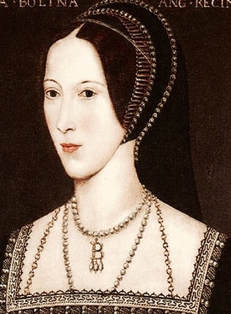 Anne de Boulogne
Anne de Boulogne
Henry was having a ball, gunpowder artillery and all. With Charles Brandon at his side this was like the good old days, this was party time. He was as merry and in as good health as Seymour had seen him for seven years – seven years all but to the month since Jane Seymour died.
This foray to Henry VIII, in his absolute determination to go back to Boulogne, was cathartic, he was cleansing, exorcising himself from events past. In late 1532 Henry had visited France with Anne de Boulogne to visit King Francis. There was lavish entertainment in and around the then English town of Calais and the French-governed Boulogne. During the visit, Francis supported their proposed marriage and promised to tell the pope as much, a promise that the following year, he famously reneged on. Taking heart from Francis’s approbation, sometime during or immediately after the visit Anne and Henry were married.
Sanctified thus, within a few weeks, Anne was pregnant.
This foray to Henry VIII, in his absolute determination to go back to Boulogne, was cathartic, he was cleansing, exorcising himself from events past. In late 1532 Henry had visited France with Anne de Boulogne to visit King Francis. There was lavish entertainment in and around the then English town of Calais and the French-governed Boulogne. During the visit, Francis supported their proposed marriage and promised to tell the pope as much, a promise that the following year, he famously reneged on. Taking heart from Francis’s approbation, sometime during or immediately after the visit Anne and Henry were married.
Sanctified thus, within a few weeks, Anne was pregnant.
Retribution
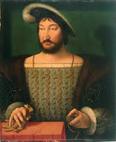 King Francis I of France
King Francis I of France
Henry never forgave Francis for betraying him, and later claimed that he was tricked into marrying Anne de Boulogne by witchcraft.
Was this gratuitous bombardment of the town and the ‘defacing and plucking down of the church’, where perhaps Henry was married to Anne de Boulogne, retribution for a betrayal and a coerced entry into a marriage that this lifelong Roman Catholic king, would never – ever, have entertained, but for Francis’s promise?
M.H.
Was this gratuitous bombardment of the town and the ‘defacing and plucking down of the church’, where perhaps Henry was married to Anne de Boulogne, retribution for a betrayal and a coerced entry into a marriage that this lifelong Roman Catholic king, would never – ever, have entertained, but for Francis’s promise?
M.H.
